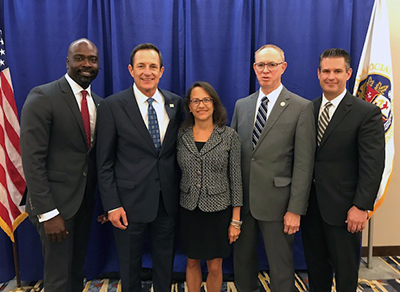Earlier this week, nearly 50 of California’s hospital and health system leaders trekked almost 3,000 miles to Washington, D.C. Their purpose: to share with members of Congress the legislative changes they need to successfully meet their mission of care back home.
It was an impressive showing for this year’s joint advocacy program, hosted by your California Hospital Association and the American Hospital Association. I am grateful to have been able to spend time with John Muir Health President & CEO Cal Knight, CHA’s Board Chair, along with Stanford Health Care President and CEO David Entwistle, and Alameda Health System CEO Delvecchio Finley, California’s representatives on AHA’s Board of Trustees.
 |
| From left to right: Delvecchio Finley, CEO, Alameda Health System; AHA Board of Trustees Chair Brian Gragnolati, President & CEO, Atlantic Health System; Carmela Coyle, President & CEO, CHA; Cal Knight, President & CEO, John Muir Health; David Entwistle, President/CEO, Stanford Health Care |
House Speaker Nancy Pelosi, who represents San Francisco, was a keynote speaker and touched on some of the major issues facing the nation and health care in particular.
“We have a common goal of affordable quality health care for all,” Pelosi said.
She then thanked California’s hospital leaders for joining her on that path.
I, too, would like to extend my thanks to all who were there. It is when we stand together that we are strongest, and our federal representatives – through meetings with nearly every member of California’s congressional delegation, and in social events – heard loud and clear three key messages.
First, health care affordability must be addressed, and hospitals are ready to do their part. That said, Medicare for All is not the right solution. Rather, tailored policies (many of which require federal support) that account for the unique needs of different communities should be employed.
Second, patients should be protected from “surprise” medical bills, which often result from “surprise” insurance claim denials. This should be done by supporting effective, fair state laws and by enacting comprehensive federal legislation that does not rely on artificial price regulation.
Third, none of these efforts should impede hospitals’ ability to care for those in need. Proposals that would diminish already stretched hospital and health system resources (like the impending $4 billion disproportionate share hospital payment cut) jeopardize both access to care and the quality of care. Instead, legislators should support initiatives that promote access and quality.
Amid the cacophony on Capitol Hill these days, it can be easy for hospitals’ voice to get lost in the din. This week’s efforts represent another way that your CHA is working to make sure hospitals are heard by those in power, so our messages are not dismissed, and so that the life-saving and life-changing work you do continues.
— Carmela
